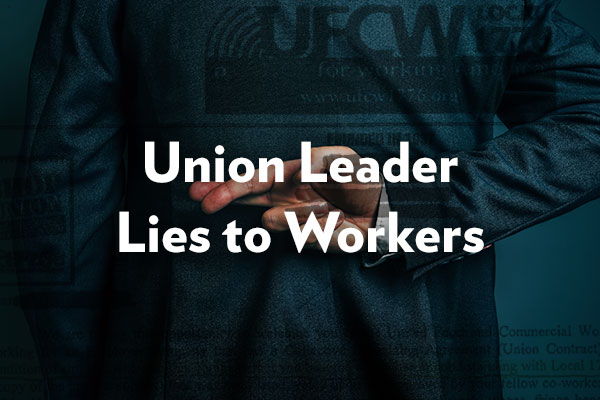Commentary

Liquor Store Clerk Scores a Win for Free Speech
When union officials told John Kabler that he had to join their organization and pay dues if he wanted to keep his job, he reluctantly complied. When he later discovered he legally did not have to join, he tried to resign but ran into stiff resistance from the United Food and Commercial Workers, Local 1776.
After Kabler was hired as a state liquor store clerk in April 2017, he attended what court documents describe as a “mandatory, employer-sanctioned orientation session for new hires” that set in motion a legal battle over free speech rights–end ended in Kabler’s favor this past April.
During the orientation session, officials with Local 1776 told Kabler that he had to join the union as a condition of his employment and pay union dues, according to his legal complaint filed with the Middle District of Pennsylvania.
“At no time did Mr. Kabler want to subsidize Local 1776, which he was and is opposed [to doing] ,” the complaint says.
In July 2018, Kabler sent a resignation letter to Local 1776. But just a few days later, the liquor store clerk received an email from his employer, informing him that a provision of a collective bargaining agreement enabled the UFCW to reject efforts by union members to resign unless they did so within a 15-day window that occurred every three years. This window period is made possible through a provision of Pennsylvania’s labor law known as maintenance of membership.
The Fairness Center, a nonprofit law firm based in Harrisburg that represented Kabler, has made the argument that Pennsylvania labor law is out of step with the First Amendment rights of public employees like Kabler and with the 2018 U.S. Supreme Court ruling know as Janus v. AFSCME, which struck down mandatory union fees in the public sector as unconstitutional. The UFCW was always on shaky ground in the Kabler case since there was no requirement for him to join the union despite what Local 1776 officials told him. This was true even before the Janus ruling.
Kabler’s suit challenged the constitutionality of maintenance of membership, and also asked for a refund of the dues collected from his paycheck. He ended his lawsuit after the union “capitulated to his demands,” a press release from the Fairness Center says.
This is a victory for me…After union officials misled me into joining the union, they also denied my resignation, forcing me to pay years of union dues against my will. Because of this lawsuit, I’m out of the union, the union has returned more than $1,700 in dues and interest, and the union abandoned the contract provision that trapped me and my fellow liquor store employees in membership.
The motion of dismissal in Kabler’s favor is available here.
As a result of the suit, the UFCW contract with the commonwealth no longer restricts the roughly 3,000 employees of the Pennsylvania Liquor Control Board from resigning union membership.
Legislation in the general assembly would end “maintenance of membership” and require government agencies to inform workers of their free speech rights. But thanks to legal pressure from Kabler, and other public employees, there are palpable signs unions are already beginning to relent on their mandates.
“John took a courageous stand against a powerful union that was determined to force him to pay union dues against his will,” says Nathan McGrath, the Fairness Center’s vice president and director of litigation. “John’s case is particularly important for spreading the message to public-sector employees that, despite what they may be told by union officials, they do not have to be a union member as a condition of employment.”